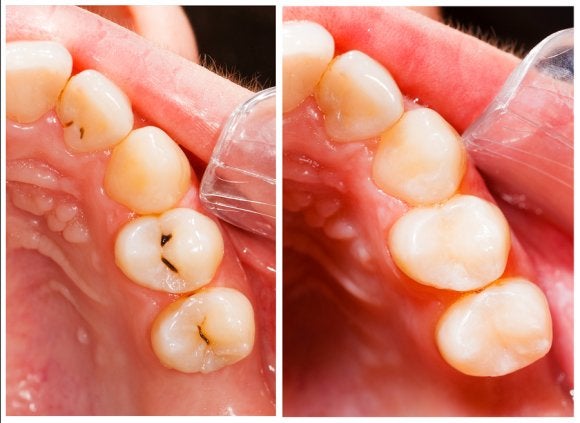-
The Uses of Composite Fillings
Composite fillings are used in emergency dentistry, general dentistry, and cosmetic dentistry to restore and repair teeth. Composite fillings are created from a mixture of plastic and glass. They are tooth-colored, making them appear very natural and almost unnoticeable when used to repair a tooth. If your tooth is damaged, visit a dentist near you in Bel Air and ask about composite fillings.
If a tooth is cracked, damaged, chipped, or broken due to decay or trauma, your dentist may recommend removing the damaged portion of the tooth, and replacing it with a composite filling. The composite filling is applied to the tooth in layers, and a special light is used between each layer to harden it. After the filling is complete, the dentist shapes the composite to naturally fit the tooth and match surrounding teeth.
Composite fillings are often used because they look so natural. Your dentist can blend different shades together to perfectly match the natural color of your tooth. Composite fillings also bond to the remaining portion of the tooth, supporting its structure. This protects the tooth from further damage, and insulates it from sensitivity caused by temperature fluctuations. If a damaged tooth is left untreated, more significant treatments, such as root canal therapy, may become necessary.

-
An Inside Look at Root Canals
A root canal procedure is a method used by general and emergency dentists to save a tooth that has been infected due to decay or trauma. Root canal therapy is an alternative to undergoing a tooth extraction and then having to receive a dental implant or dentures to replace the missing tooth. If you’re in need of a root canal in Bel Air , keep reading to learn more about the procedure.
Why Root Canals Are Necessary
A root canal procedure is necessary if the tooth’s nerve is infected, or if the dental pulp is damaged. When this infection or damage occurs, the nerve root and pulp begin to break down, allowing bacteria to multiply in the pulp chamber. This bacteria can even cause an abscessed tooth. It can also lead to bone loss, drainage problems, or swelling in the face, neck, or head.
bacteria can even cause an abscessed tooth. It can also lead to bone loss, drainage problems, or swelling in the face, neck, or head. What Symptoms Indicate an Infection
If you’re suffering from an infected nerve root or damaged pulp, there may be a few obvious signs and symptoms that you’ll notice. You’ll experience a severe toothache, or intense pain when biting, chewing, or grinding. Your infected tooth will be extremely sensitive to hot and cold temperatures, even when the stimulus is removed. The gum tissue around the infected tooth will become tender, sensitive, inflamed, and swollen. You may notice that the infected tooth has become discolored, or appears darker than surrounding teeth.How a Root Canal Procedure Is Performed
A dentist or endodontist can perform a root canal procedure in the dental office. Your dentist will first take X-rays of your teeth to see how far the infection has spread. You’ll then be given local anesthesia. Your dentist will drill a hole into the infected tooth, through which he’ll remove the decayed nerve root, damaged dental pulp, and any other debris. The tooth is then thoroughly cleaned, injected with medication and antibiotics, and sealed with sealer paste and a rubber compound. Your dentist may recommend that a dental crown be placed on the tooth to further protect it. -
What Exactly Is Fluoride?
You probably know that you should brush your teeth twice a day using fluoride toothpaste. If you are not a dentist in Bel Air , however, you may not understand the significance of fluoride. This ion can help you keep your natural tooth enamel and avoid restorations like veneers down the road. Watch this video to learn more about fluoride.
Fluoride is an ion that can bolster your teeth and help them to fight against cavities. You can find fluoride in soil, water, and rocks, and it is added to some community water and mouth rinses. Fluoride is important because it combats the acids that attack your tooth enamel. If your diet involves a substantial amount of carbs, this is especially important. Your dentist can apply fluoride to your teeth at your next dental checkup, but it is important to use an accepted fluoride toothpaste when you brush your teeth on your own.
-
The Truth Behind Gum Disease Myths
In order to keep yourself in proper oral health, it is helpful to differentiate myth from truth. Unfortunately, there are many myths about gum disease that your dentist in Bel Air will confirm are false. Getting the facts about gum disease will allow you to react to the warning signs and prevent this condition from developing further. Read on for a look at the truth behind gum disease myths.
Myth: Proper Oral Hygiene Will Always Prevent Gum Disease
Practicing proper oral hygiene by brushing and flossing your teeth every day is a great way to keep your teeth and
gums in good shape. However, oral hygiene is not the only factor that determines your risk for gum disease. Even if you are completely dedicated to oral hygiene, there are other elements that may still put you at risk for this condition. Tobaccouse is one factor that may counteract your daily brushing and flossing. Your genetics, nutrition, and the level of stress that you endure on a daily basis may also impact your vulnerability to gum disease . While proper oral hygiene can certainly help, it is important to assess these other factors.
Myth: You Cannot Replace a Tooth Lost from Gum Disease
Advanced gum disease can lead to tooth decay and tooth loss, but this is by no means an indicator that you cannot have the tooth replaced. If you suffer from gum disease, you should be communicating with your dentist more frequently in order to treat the problem. In some cases, part of this treatment includes restorations like dental implants. A dental implant will replace your tooth and serve you with a number of benefits including retained bone mass and straight teeth.Myth: Gum Disease Cannot Affect Your General Health
Your oral health and general well being are linked in ways that many people are not aware of. It is important to realize that gum disease can impact your general health by further progressing other conditions like diabetes and heart disease. If you think you might be suffering from gum disease, it is wise to talk to your dentist immediately. -
Cosmetic Dentistry Spotlight: Lumineers
If you have cracked, damaged, or gapped teeth, you may have considered the possibility of using porcelain veneers to treat your issue. While this can be a perfectly suitable treatment, others would prefer to ask their dentists in Bel Air about Lumineers. Lumineers are very similar to porcelain veneers, but there is an important difference. No matter the situation, it is important to talk to your dentist to find out what dental treatment will best suit your needs. In the meantime, read on as we put the cosmetic dentistry spotlight on lumineers.
The primary difference between lumineers and traditional veneers is that lumineers can be placed without removing tooth structure. In the case of conventional porcelain veneers, your dentist will shave off a small amount of your enamel to make room for the veneer. On the other hand, lumineers are so thin that this shaving of tooth structure is not necessary. It should be noted, however, that not everyone is eligible for lumineers. Since there will be no shaving of the tooth there is no need for anesthetic either. Unlike traditional veneers, the lumineers process is reversible and can be undone, although they are capable of lasting for more than two decades.

-
Popular Ways to Improve Your Smile’s Appearance
It is possible to have properly functioning teeth that are not as aesthetically pleasing as you might want them to be. Individuals who encounter this problem typically look to cosmetic or general dentistry near Bel Air to have their teeth improved. There are a few different treatments that you can use to improve your smile, so it helps to talk to your dentist to find out which treatment is right for you. Keep reading if you would like to learn about some of the popular ways to improve your smile’s appearance.
Dental Crowns
A dental crown is a versatile treatment
that can address a number of issues. Your dentist may suggest a dental crown if you have one or more teeth that is diminished or damaged. A crown may be preferable to a dental filling if you have a tooth that has experienced a significant amount of decay. Your dentist can also use a dental crown as part of a dental implant procedure , which is a common form of treatment for missing teeth. In this case, you would have an implant applied to your jawbone with a dental crown attached to it to serve as a fully functioning—and cosmetically pleasing—tooth.
Teeth Whitening
Although it might not be quite as popular anymore, many people still use tobacco products on a daily basis. Other people depend on highly caffeinated drinks like coffee and tea to get them through the day. These habits can quickly lead to discolored teeth. Tobacco use may yellow your teeth, while frequent coffee and tea drinking can stain your teeth to a darker color. If your oral woes do not extend further than the shade of your teeth, consider teeth whitening. This can be done at home or in office and produces noticeable results.Dentures
If you are missing most or all of your teeth, you might consider improving your smile with dentures. Properly fit dentures can restore your ability to chew food, have a conversation, and smile with confidence. Talk to your dentist about the right types of adhesives to use in order to make the most of your dentures. -
Teeth vs. Food: The Good and the Bad [INFOGRAPHIC]
Everyone wants to have a beautiful smile full of healthy, white teeth. Depending on what you’re eating, however, you could be doing your teeth a disservice. Certain foods are better for your mouth than others, as your dentist near Bel Air will tell you. You probably know that both hard and chewy candies contain a lot of sugar, which can lead to tooth decay. You may be surprised to find out that even certain fruits are less than ideal for your teeth because they contain high levels of acid. Foods such as low-fat cheese, apples, and crunchy carrots are all mouth-healthy choices. Check out this infographic from Your Smile to learn more about what foods to eat and what to avoid for the health of your teeth and gums. Please share with your friends and family!

-
What Is Orthodontics?
When you meet with your orthodontist in Bel Air , his or her primary concern will have to do with the way your teeth and facial muscles interact with each other. Orthodontics can be used in combination with cosmetic dentistry to achieve an attractive and efficiently functioning smile. Watch this video clip to find out more about orthodontics.
Just like your dentist, your orthodontist will conduct a mouth exam in order to take a detailed look at your teeth and gums. Depending on what he or she finds, a treatment plan may be devised. This mouth exam allows your orthodontist to find out if your teeth are growing in evenly as well as their proper placement. Braces, wires, and headgear are common orthodontic treatments that are used to correct misaligned teeth and yield proper bites. More and more adults are using braces and other orthodontic procedures due their newly discreet nature.
-
Improving Your Smile with Veneers
If you long for the days when your smile was bright, full, and gapless, you may be interested in learning about veneers in Bel Air. This type of treatment can improve your smile in a number of ways. Many individuals enjoy the relatively noninvasive nature of veneer treatment; unlike other dental procedures that treat similar problems, veneer application is not an invasive surgical procedure. Continue reading if you are interested in finding out how you can improve your smile with veneers.
Why Choose Veneers?
Veneers may be an excellent choice if you suffer from cracked, damaged, or discolored teeth. Your dentist can cover your diminished teeth with veneers to protect them from further damage and revitalize your smile. This will provide you with a newfound sense of confidence and a reason to smile. Veneer treatment can resolve problems stemming from gaps in your teeth, and it can even improve your bite in some cases. If you are a coffee drinker or a cigarette smoker and your discolored teeth resist teeth whitening treatments, veneers can make for a suitable alternative . In the event that you are having just one or two veneers placed, your dentist can match the shade of your veneers to the color of your natural teeth.
gaps in your teeth, and it can even improve your bite in some cases. If you are a coffee drinker or a cigarette smoker and your discolored teeth resist teeth whitening treatments, veneers can make for a suitable alternative . In the event that you are having just one or two veneers placed, your dentist can match the shade of your veneers to the color of your natural teeth. What Is the Procedure Like?
Visit your dentist if you think veneers might be right for you. If your dentist agrees, he or she will remove a small amount of enamel from the teeth that will receive veneers; this is done so that the veneers fit in with your teeth rather than protrude from your mouth. The natural tooth will be coated with a special resin, and your dentist will use a curing light to bond the veneer to your tooth. You can then begin to enjoy your new smile immediately by showing it off on your way out of the dentist’s office.What Are “No Prep” Veneers?
Your dentist may be able to apply a veneer without removing much enamel from your tooth. This treatment is even less invasive and can be done more quickly, but not everyone is eligible for the procedure. -
Spotting the Signs of Gingivitis
Failing to take care of your teeth properly and see your dentist in Bel Air on a regular basis can result in problems such as gingivitis. If left untreated, this condition may progress into periodontal disease and can result in tooth loss. It is helpful to familiarize yourself with the various signs and risk factors associated with gingivitis. Continue on if you could use some help spotting the signs of gingivitis.
The symptoms of gum disease are not always obvious, which makes the condition difficult to detect in some cases. One of the most prevalent red flags is the presence of blood when you brush your teeth. If you notice that your gums are bleeding, it is wise to schedule an appointment with your dentist in the near future. Your gums may also be swollen and tender to the touch. Another sign of gingivitis is shifting of your teeth or change in your bite. If you feel like your teeth do not fit together the way they usually do, visit your dentist to find out if you have gingivitis. Individuals who use tobacco products, practice poor dental hygiene, or have certain illnesses should be particularly wary regarding these signs.

RECENT POSTS
categories
- Uncategorized
- General Dentistry
- Toothache
- Emergency Dentistry
- Family Dentistry
- Receding Gums
- Cosmetic Dentistry
- Veneers
- Gum Disease
- Gingivitis
- Dental Crowns
- Orthodontics
- Dental Implants
- Root Canal
- Wisdom Teeth
- Teeth Whitening
- Your Smile
- Composite Fillings
- Lumineers
- Dentures
- Invisalign
- BrightSmile
- Dental Bridge
- Abscessed Tooth
- Sealants
